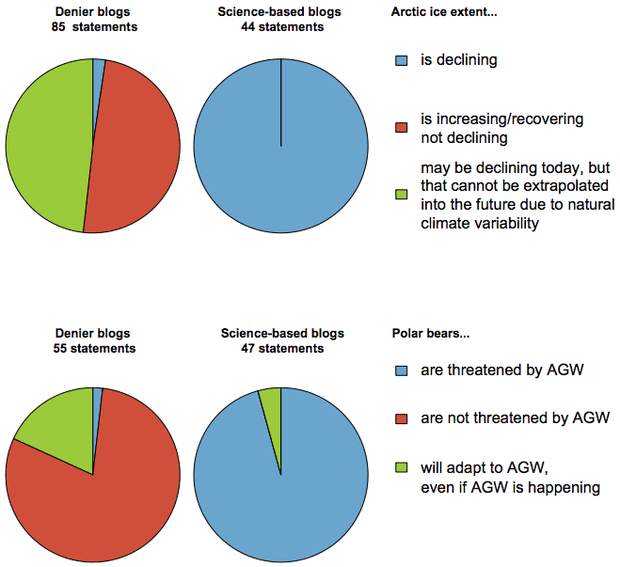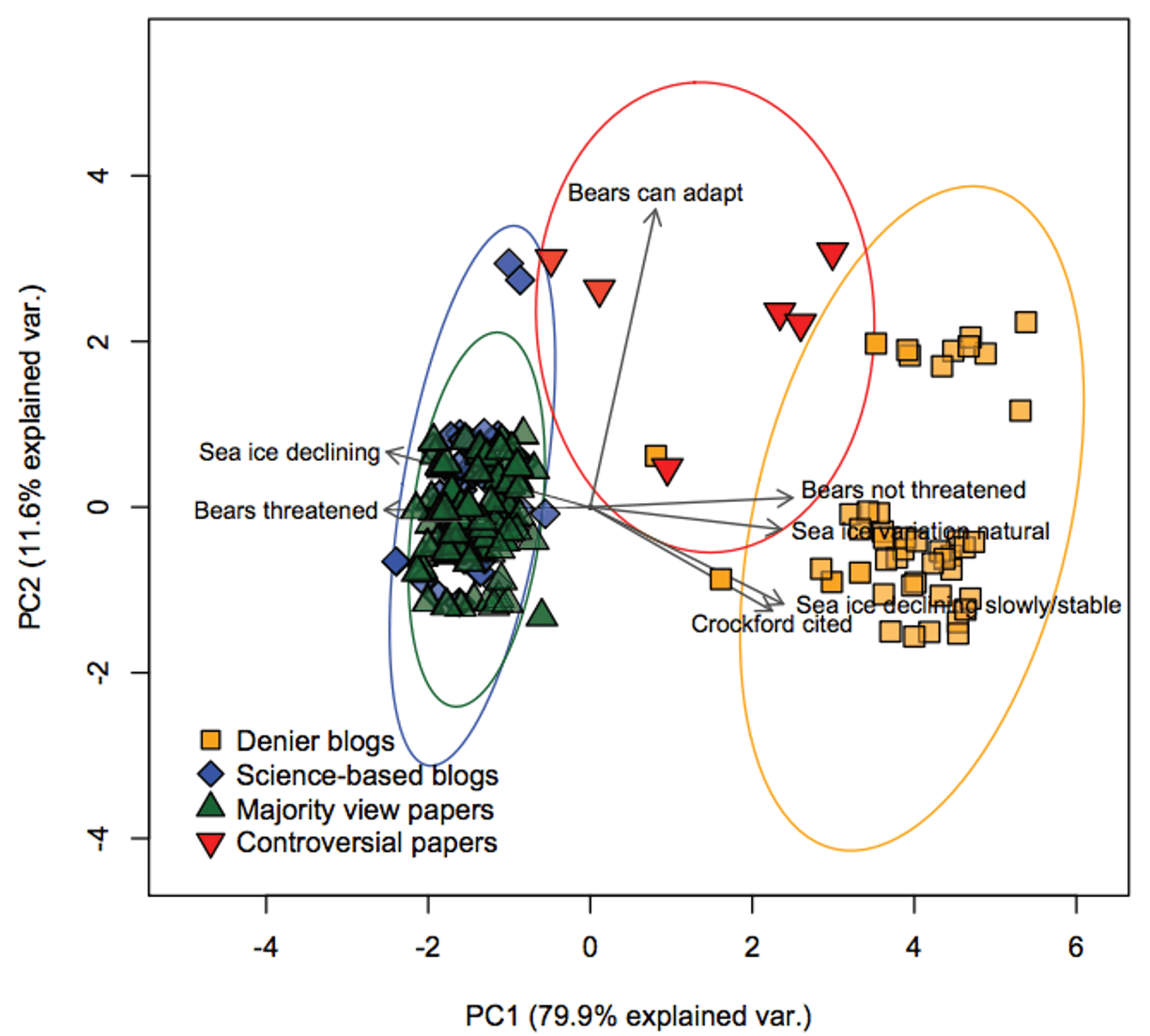New study uncovers the 'keystone domino' strategy of climate denial
Posted on 29 November 2017 by dana1981
The body of evidence supporting human-caused global warming is vast – too vast for climate denial blogs to attack it all. Instead they focus on what a new studypublished in the journal Bioscience calls “keystone dominoes.” These are individual pieces of evidence that capture peoples’ attention, like polar bears. The authors write:
These topics are used as “proxies” for AGW [human-caused global warming] in general; in other words, they represent keystone dominoes that are strategically placed in front of many hundreds of others, each representing a separate line of evidence for AGW. By appearing to knock over the keystone domino, audiences targeted by the communication may assume all other dominoes are toppled in a form of “dismissal by association.”
Basically, if these bloggers can create the perception that the science underlying polar bear or Arctic sea ice vulnerability to climate change is incorrect, their readers will assume that all of climate science is fatally flawed. And blogs can be relatively influential – surveys have shown that blog readers trust them more than traditional news and information sources.
Denier blogs and science-based blogs “diametrically opposite”
In this study, the authors examined the arguments made by 45 denier blogs and 45 science-based blogs regarding the impact of human-caused global warming on polar bear populations and Arctic sea ice extent. They found that the science-based blogs all showed that Artic sea ice is declining, and nearly all said that global warming threatens polar bear populations.
Conversely, the denier blogs nearly all denied that Arctic sea ice is declining or argued that we can’t predict how it will change in the future, and that polar bears aren’t threatened and/or will adapt to climate change.

Pie charts showing the percentage of 45 science-based and 45 denier blogs expressing positions on the effects of human-caused global warming (AGW) on Arctic ice extent and polar bears. Illustration: Harvey et al. (2017), Bioscience
The authors also noted that unsurprisingly, the science-based blogs had much stronger supporting arguments:
Scientific blogs provided convincing evidence that AGW poses a threat to both, whereas most denier blogs did not. Science-based blogs overwhelmingly used the frame of established scientific certainties and supported arguments with the published literature affirming that warming is rapidly reducing seasonal Arctic sea-ice extent and threatening the mid- to longer-term survival of polar bears, whereas those written by deniers did not.
In fact, on the question of polar bears, the study authors found that as their primary source, nearly 80% of denier blogs referenced another blog written by a zoologist named Susan Crockford. However, Crockford has never conducted research on current polar bear populations or published any peer-reviewed studies on the subject. There are experts on this subject, like the Polar Bear Specialist Group, but deniers cite Crockford quite simply because she’s one of the few scientists who tells them what they want to hear.
Science isn’t on the deniers’ side
The study authors also examined 92 peer-reviewed papers on polar bears and Arctic sea ice and grouped them using the same categories as the denier and science-based blog posts. As the figure below shows, the scientific research (green triangles) is extremely consistent in concluding that climate change threatens both polar bears and Arctic sea ice, although a few papers (6.5% - the red triangles) suggested that polar bears might be able to adapt to their changing environment.
The science-based blogs (blue diamonds) cluster quite closely to the findings in the scientific research, while the denier blogs (yellow squares) are off in their own world denying that human activity is causing a long-term decline in polar bear populations and Arctic sea ice.

Categorization using principle component (PC) analysis of statements regarding polar bears and Arctic sea ice from 90 blogs and 92 peer-reviewed studies. Illustration: Harvey et al. (2017), Bioscience
Indeed, the scientific research is quite clear that Arctic sea ice is in the midst of a rapid decline due primarily to human-caused global warming. Because polar bears rely on sea ice to hunt seals, global warming also threatens their species. While some polar bear sub-populations are stable thus far, others are declining, and that trend will only accelerate as sea ice continues to disappear.
Scientists: go forth and debunk myths
The authors conclude their paper by encouraging their scientific colleagues to engage with the public and counter scientific misinformation:
We believe that it is imperative for more scientists to venture beyond the confines of their labs and lecture halls to directly engage with the public and policymakers, as well as more strongly confronting and resisting the well-funded and organized network of AGW denial. This can be done in numerous ways. For example, scientists can be more proactive in approaching the media to emphasize the importance of research findings or to counter misinterpretations. They can also begin to encourage initiatives that empower citizen participation in scientific research, such as citizen science, as is being done currently at several major universities and research institutes. Moreover, scientists need to more effectively use Internet-based social media to their full advantage in order to turn the tide in the battle for public opinion.
They note that this is no simple request because there are few rewards in academics for those who combat misinformation. In fact, many like Katharine Hayhoe, Michael Mann, a Ben Santer have been attacked for their scientific work through what study co-author Mann coined ‘the Serengeti Strategy’:
Nevertheless, climate denial can be influential, and climate scientists remain trusted sources.































 Arguments
Arguments






























The Freedom experiment has been a long proven failure. The Public Interest in developing a lasting better future for all of humanity is too easily popularly compromised by damaging unsustainable pursuits of personal desires.
People freer to believe whatever they want and do whatever they please needs to understood to be a damaging simplistic Dogma like the fantasy of the Inherent Good Power of the Invisible Hand or Say's Law.
Yes people do indeed latch onto a few selective issues to try to discredit entire theories. Of course intelligent open minded people know this is false logic, but not everyone does, or they are so blinded by their politics they just dont care.
It's a tough one, as things like polar bear examples make the issue real and relatable compared to some graph of climate trends, but at the same time are somewhat easy to pick holes in, especially as trends are currently only declining overall and not everywhere. Hopefully people see the big picture, not one study that shows an increase in some limited area.
I find it useful understand the polar bear issue by doing a simple thought experiment to imagine the arctic totally ice free, or nearly ice free, which is a very possible scenario in our lifetimes. This means no ice for polar bears and changes to seal populations etc.
Where do the polar bears go? Its almost certainly much too fast for them to biologically evolve and adapt to alternative environments. This sort of evolution takes centuries to millenia. Polar bears do not have the inventive nature of humans to use tools and innovate their way out of changing environments, and even humans can only do this up to a certain point. Its going to be game over for polar bears.
We have seen numerous species go extinct through not only hunting but environmental pressures. Some studies on species already affected badly by climate change and other environemntal problems here and here
Says law was introduced in 1803, and Adam Smiths wealth of nations / invisible hand idea was introduced in 1776. Both are social science theories based on a dubious concoction of speculation, theory, and roughly assembled observed evidence. Both have an element of partial truth and value, but are also deeply flawed / incomplete understandings as well.
It beggars belief that a single human being would think some theory written hundreds of years ago is by definition likely to be the complete picture, or fully correct. Newtons laws of physics are far more rigorous than Says law or Smiths invisible hand ideas, yet even Newtons work was shown to only be a partial explanation of reality by Einstein.
Free markets are much more complex than Smith thought, and used by ideologues as a simplistic excuse to give people permission to burn fossil fuels and pollute. But history has shown certain particular free markets dont always work, and produce adverse outcomes, and with boundaries and rules they start to work properly.
We learn as we go along, except climate denialists don't learn and would have to rank among the most ideogically driven and stubborn, delusional people I know capable of immense feats of non logic when it comes to attacking theories that ruffle their feathers.
Re: #3
You do Adam Smith a great injustice. The Wealth of Nations is as good a description of economics for a non-mathematical work as The Origin of Species is of Evolution. Too much is made of the "invisible hand", which is a mataphor, not a law. Some other quotes from Smith:
Incidentally, environmental economics has been around for a century or more, starting with the British economist Arthur Pigou. Taxes on externalities like pollution are still called Pigovian Taxes. Pigou had a wonderful paradigm example on the conflict between rabbit-breeders and lettuce-growers. His solution was a tax on the rabbit-breeders to compensate the lettuce-growers. No one has come up with a better one.
Arthur_Cecil_Pigou
Shoemore @4, I agree there's plenty of sense in large parts of Wealth of Nations. I did say that elements made sense. I was simply pointing out some of the problems, and being blunt to make a point forcefully.
Sadly some people with policial motives select messages from wealth of nations out of context and twist the meaning and conveniently ignore other parts (particularly the ones you quoted). This is exactly what climate sceptics often do
But its important to realise that economics is still an evolving science with macroeconomics today still being much less certain and resolved than the physical sciences. So quoting and interpreting books on economics needs to be done with care.
Shoemore @5, very interesting. Also known as the tragedy of the commons problem. Much of America doesn't think this problem exists,or that the invisible hand will fix it. They are wrong as history shows time and again.
Environmental problems are one area of human endevour that require legislative solutions of various kinds including laws, taxes and so forth.
However we can also hope that corporates may improve their behaviour on their own initiative, and simply because it's the right way to act. There are some postive signs with some corporations recently in respect of environmental concerns.
Its important for people to realise the invisible hand simply means that free individuals create maybe for selfish motives, and this is ok and in a free market setting desirable products will succeed. It doesnt mean people should be permitted to do things damaging to the public good.
The invisible hand also has limitations. Markets dont provide all the goods we need for various reasons. Sometimes governments need to help.
Adam Smith was more philosopher than economist— as some of the quotes above would suggest, he was concerned with ethical, not just economic issues. (Incidentally, I've read that Smith concealed his work on 'Wealth of Nations' from his friend, David Hume, for fear that engaging with Hume would be overwhelming and make it impossible for him to complete the book.) But Nigel is certainly right- the 'free market' fundamentalism that invokes Smith and treatshis invisible hand as if it were some kind of infallible optimizer of outcomes is an absurd abuse of Smith's views.